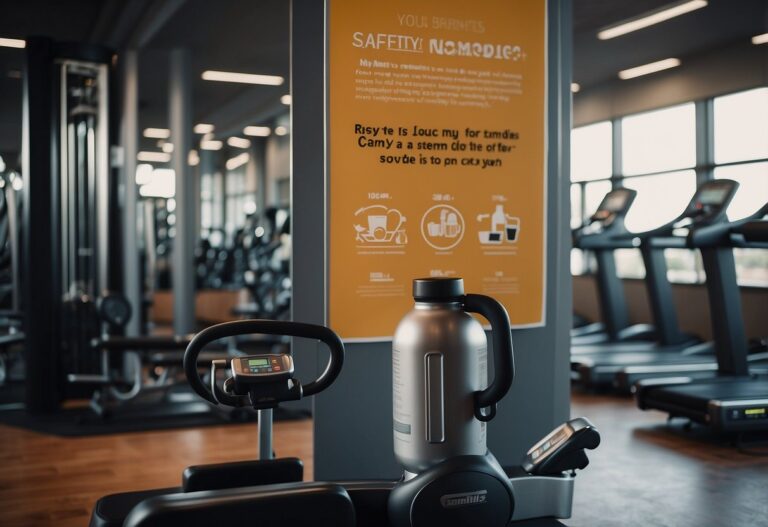Starting and sticking to a workout routine can be challenging, especially with the many distractions and demands of everyday life. You might feel excited at the beginning, but maintaining that enthusiasm over time is the real test. It’s important to find strategies that keep you motivated and engaged.

Why is consistency in your workout routine so crucial? Regular exercise not only helps in achieving physical fitness goals but also improves mental well-being and overall health. With the right tips and mindset, you can develop a routine that fits into your lifestyle and keeps you committed to your fitness journey.
Set Clear Goals
Setting clear goals is key to sticking with your workout routine.
Start by creating SMART goals: Specific, Measurable, Achievable, Relevant, and Time-bound. For example, instead of saying “I want to get fit,” say “I want to run 5 km in 30 minutes within three months.”
Write down your goals and keep them visible. Seeing them daily can keep you motivated and remind you of what you’re working towards.
Celebrate small milestones. If your goal is to exercise four times a week, reward yourself for hitting that target. Little rewards can keep you motivated over time.
Create a Schedule
When creating a workout schedule, it’s important to find a routine that fits your lifestyle.
Think about your daily commitments. Are you a morning person or do you prefer evenings? Choose times when you’re most likely to stick with it.
Consistency is key. Set aside specific days and times each week for your workouts. This helps build a habit.
Don’t forget to be flexible. Life happens! If you miss a session, just get back on track with the next one.
Use reminders. Post sticky notes with your workout goals in visible places like your bathroom mirror or computer screen. This keeps you motivated and on track.
Remember, creating a schedule that fits you makes it easier to stick to your fitness goals.
Find a Workout Buddy
Having a workout buddy can make exercising more fun and keeps you motivated. Working out with a friend or partner can help you stay committed to your fitness goals.
You don’t need to meet up in person to train together. Many people work out over video calls or at the same time of day. This way, location isn’t a barrier.
Fitness apps can help you find workout partners who share your interests and schedule. Some even offer progress tracking and routine suggestions, making it easier to stay on track.
Working out with your significant other can also bring you closer together. Sharing a physical challenge can help you both feel more connected and satisfied in your relationship.
Track Your Progress
Keeping track of your progress is crucial for staying motivated. Whether using a journal or an app, noting your workouts helps you see improvements over time. You could track your weights, reps, and sets for each exercise, just like many fitness enthusiasts do.
Celebrate small achievements. Didn’t miss a workout this week? Write it down. When you notice these wins, it keeps you going. Seeing how far you’ve come is a great confidence booster.
Taking body measurements can also be useful. Measure your chest, stomach, biceps, and thighs weekly. As you gain lean muscle, these numbers will change, helping you stay committed to your goals.
Additionally, consider setting SMART goals. Make them specific, measurable, and achievable. For example, “I want to gain 20 lbs of muscle” is clear and easy to track. This method keeps you focused and on the right path.
Mix Up Your Routine

Switching up your workout can keep things exciting and help you stay motivated. Instead of sticking to the same exercises, try new activities like swimming, cycling, or even dance classes. Mixing it up can help you discover new interests and prevent boredom.
Try working out at different times of the day. If you usually exercise in the morning, give evening workouts a shot. Changing your routine can fit better with your schedule and provide a fresh perspective.
Consider working out with a friend. Exercising with someone else can make workouts more enjoyable and keep you accountable. Plus, it can be fun to share the experience with a friend. Read more about working out with friends.
You might also want to try different workout environments. If you usually go to the gym, try working out in a park or at home. New surroundings can bring a new level of excitement to your routine.
By mixing up your workout routine, you keep things interesting and stay motivated to continue your fitness journey.
Reward Yourself

It’s important to reward yourself for sticking to your workout routine. When you acknowledge your hard work, it can boost your motivation to keep going.
Consider treating yourself to a fun activity after a workout. For example, you could hit up a comedy club for some laughs. Laughter releases feel-good endorphins, similar to exercise.
Another idea is to set small goals and reward yourself when you reach them. This could be as simple as enjoying your favourite snack or buying a new workout outfit. Rewards create a positive association with exercising.
Stay Educated on Fitness
Staying informed about fitness can make a big difference in your routine.
Learn about different workout types and techniques. This helps you optimise your workouts and avoid injuries.
Reading fitness articles and blogs can be insightful. Websites like Well+Good offer useful tips and tricks.
Attending fitness classes or workshops can provide hands-on learning. Trainers can give you personalised advice and help you stay motivated.
Educating yourself keeps you engaged and helps you make informed decisions about your health.
Listen to Your Body

Listening to your body is key to a successful workout routine. Start by getting familiar with your body’s basic signals. Notice how your muscles feel during different exercises and take note of any discomfort or pain.
When working out, it’s important to recognise when you need rest. Pushing through pain can lead to injuries. If something feels off, it’s better to take a break.
Pay attention to your energy levels. Some days you might feel full of energy, while other days, you might feel tired. Adjust your workout intensity based on how you feel.
Remember, it’s about consistency, not perfection. Listen to your body and adjust to what it needs. This will help you stay motivated and avoid burnout.
Invest in Quality Gear

You might not think it, but having the right workout gear can make a big difference in your exercise routine. Investing in high-quality gear can improve your comfort and performance.
Good equipment like fitness watches or heart rate monitors can help you track your progress. You’ll find it easier to stay motivated when you see your growth.
Comfortable, well-made shoes are essential too. Your feet will thank you during those long runs or gym sessions. Wearing gear that fits properly can prevent injuries and make your workouts more enjoyable. Quality clothing can also wick away sweat better, keeping you dry and cool.
Think about how good gear could make your workouts feel even better. Next time you gear up, remember that a small investment can lead to big benefits.
Considering adding some essential items to your kit might give your routine a nice boost. After all, feeling great in what you’re wearing could be the push you need to stay committed. For more information on why choosing the right gear matters, check out high-quality workout gear.
Join a Fitness Class
Joining a fitness class can be a game-changer in keeping you motivated. If you’re a social person, you might thrive in a group exercise setting. Classes offer structure, a set schedule, and the chance to meet new people.
Sometimes it’s tough to stay motivated on your own. Being part of a group can help keep you accountable. When others are counting on you to show up, you’re less likely to skip.
Fitness classes often have instructors who guide you through the exercises. This can ensure you’re doing movements correctly and safely. Try out different types of classes to see which one you enjoy most.
Understanding the Importance of Routine
A consistent workout routine can have profound effects on both your mind and body. Establishing a regular exercise schedule can help you achieve long-term fitness goals and maintain a healthier lifestyle.
Psychological Benefits
Sticking to a routine can bring significant psychological advantages. Knowing when and how you’ll fit exercise into your day helps reduce decision fatigue and stress. This predictability makes it easier to stick with your workouts, lowering the chances of skipping sessions.
A regular routine also boosts your mental health. Exercise is known to release endorphins, which can improve your mood. It can also reduce symptoms of anxiety and depression. Feeling a sense of accomplishment after completing workouts can also build your self-confidence and make you feel more in control of your life.
Having a routine can help you establish good habits. When exercise becomes a part of your daily life, it requires less effort to keep going. This automaticity makes it easier to keep exercising even when motivation is low.
Impact on Physical Health
The physical benefits of a consistent workout routine are substantial. Regular exercise improves cardiovascular health, builds muscle strength, and enhances flexibility. Over time, you’ll notice increased stamina and a decreased risk of chronic diseases such as heart disease and diabetes.
Maintaining a consistent routine helps your body adapt to the demands of exercise. This adaptation leads to better performance and efficiency in your workouts. It also reduces the risk of injury because your body becomes stronger and more resilient.
Additionally, a steady workout schedule can help regulate your sleep patterns. Exercise can make it easier to fall asleep and improve sleep quality, which in turn benefits your overall physical health. Regular exercise also impacts weight management, as it helps burn calories and build lean muscle mass.
Keeping a consistent routine helps you monitor your progress more effectively. By sticking to a plan, you can more easily track improvements in your strength, endurance, and body composition. This tracking can motivate you to continue pushing your limits and reaching new goals.
Crafting a Personalised Workout Plan
Creating a workout plan that fits your needs can help you stay motivated and make progress. Here’s how to tailor a plan to your fitness level and goals.
Assessing Your Fitness Level
Before you start, it’s important to know where you’re at physically. Think about your current level of activity. Are you a beginner, someone who works out occasionally, or already quite active?
Begin with a simple test:
- Measure your resting heart rate.
- Time how long it takes you to walk or run a mile.
- Count how many push-ups or sit-ups you can do in a minute.
Keep track of these numbers. They can help you see improvements and adjust your plan.
Listen to your body:
- If you have any injuries or chronic conditions, consult a healthcare professional.
- Pay attention to what feels challenging but doable. This will help you avoid overdoing it and getting hurt.
Realistically assessing your starting point ensures that you build a plan that’s both challenging and achievable.
Setting Achievable Goals
Having clear, achievable goals is crucial for your workout plan. Start with SMART goals: Specific, Measurable, Achievable, Relevant, and Time-bound.
For example:
- Specific: “I want to run 5 km without stopping.”
- Measurable: “I’ll track my distance and time using a fitness app.”
- Achievable: “I’ll train three times a week, increasing my distance gradually.”
- Relevant: “Running improves my cardiovascular health and mood.”
- Time-bound: “I’ll reach my goal within three months.”
Breaking your goals into smaller steps makes them less overwhelming and more manageable. Celebrate small victories along the way to stay motivated.
Ensure your goals align with your fitness level. Over time, you can adjust them as you get stronger and fitter.
By assessing your fitness level and setting clear goals, you can create a workout plan that’s personalised and effective for your needs.
Maintaining Motivation and Consistency
Staying motivated and consistent with your workout routine can be challenging. Identifying common obstacles and finding effective strategies to overcome them can help you stick to your fitness goals.
Identifying Common Obstacles
One major obstacle is a lack of time. Many people feel too busy with work, family, and other commitments. This can make it hard to find even 30 minutes for a workout.
Another common issue is feeling too tired. Exhaustion from a long day can sap your energy and make exercise seem like a daunting task.
A third obstacle is boredom. Doing the same routine over and over can make workouts feel like a chore, making you less likely to stick with them.
Finally, unrealistic expectations can hurt your motivation. If you expect quick results and don’t see them, you might feel discouraged and stop exercising.
Strategies for Overcoming Challenges
To tackle the issue of time, try scheduling your workouts just like any other important appointment. Pick a consistent time each day, whether it’s early morning or late evening. This way, it becomes part of your daily routine.
If tiredness is your challenge, consider adjusting your sleep schedule. Going to bed and waking up at the same time every day can improve your energy levels. Also, short, energising exercises can help combat fatigue.
To fight boredom, mix up your routine. Try different types of exercises like swimming, cycling, or yoga. You can also work out with a friend to make it more enjoyable.
For unrealistic expectations, start with small, achievable goals. Celebrate your progress, no matter how minor it seems. Remember, getting fit takes time, but every effort counts.
By identifying what holds you back and applying these strategies, you can stay motivated and consistent in your fitness journey.







